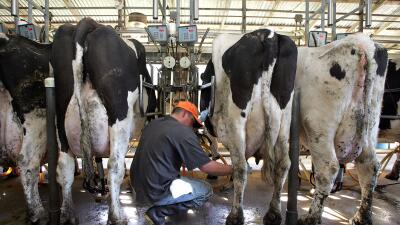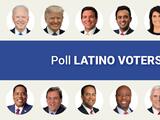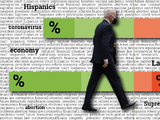In Wisconsin, even Trump supporters worry there will be no cheese without Latinos

Green Bay and Elkhart Lake, Wisconsin
John Pagel is a supporter of Donald Trump . However, he doesn’t think the idea of deporting undocumented immigrants is going to be good for his dairy farm in Kewaunee, Wisconsin, which is holding its primary on Tuesday.
In a Republican town meeting, Pagel, owner of the Pagel's Ponderosa Dairy , anxiously explained to the property magnate that the dairy industry depends on immigrants, that dairy entrepreneurs need immigration reform to keep their farms open, and also need to bring more Mexicans legally ...
"Legally!" interrupted Trump, "Ah, you said the word."
The billionaire compared the dairy industry with grape farms in California where foreigners are hired during the harvest season. He then promised a similar program for dairy farms, which "work wonderfully," but he refused to back down over his plan for mass deportation of the estimated 11 million undocumented Hispanics residing in the United States.
"Things are not that simple," Pagel told Univision News, describing how his farm produces more than 54,000 gallons of milk daily and has 140 employees, of which at least 80% are Hispanic immigrants.
(Photo caption: John Pagel sympathizes with Trump, but their mass deportation proposal could bankrupt his business)
Dairy farmers fear that if Trump’s proposal were ever implemented there would be no laborers and the price of milk in U.S. supermarkets would double, all because Latino immigrants represent more than 40% of the workforce in that industry, and 90% of them come from Mexico.
The message of Pagel and others was summed up on the other side of the political spectrum by Basilisa Hernandez, a Mexican activist who protested outside a Trump rally Trump last Wednesday in the city of Appleton.
"Without immigrants there’s no milk!" shouted Hernandez.
"We need to stay"
Wisconsin, is known as The Cheese State because dairy products are the engine of its economy.
With more than 10,000 dairy farms, 1.27 million cows, and a production of about 2,500 gallons of milk per cow per year, the northern state leads the nation in milk production, supplying 25% of the cheese across the country and 13% of the milk.
"We need to keep the immigrant workers we have, and we need others who come to stay too ... for at least three to five years," said Pagel.
The training of a dairy worker, the most in demand position in the industry, can take months, he said, adding that temporary work visas expire after only six months when workers have barely finished training.
(Photo caption: It's tough work in the milking area; exposed to weather and animal hygiene)
"The dairies are not like vegetable or fruit farms," he said. "It’s non-stop, cows are milked 24 hours a day, every day of the week and it takes a highly skilled workforce," he added, noting that they need to be familiar with animals, the milking process, and be able to withstand "tough" work.
Milk prices x 2
Regarding Trump’s proposal to deporting more than 11.4 million “illegal immigrants,” Pagel was emphatic. "It would be simply catastrophic ... It would not only break the dairies but also the service industry and many sectors of the nation’s agriculture."
For Brad Barham, an economist at the University of Wisconsin in Madison, currently "more than half of Latinos working in dairies could be undocumented immigrants."
"There is no doubt that (undocumented) immigrants contribute substantially to the national economy. They are usually very good workers and makes businesses more productive," he told Univision News.
"Any policy that seeks to ignore the economic contribution of immigrant workers is nonsense," he said.
(Photo caption: Hispanic workers are the backbone of the dairy farms in Wisconsin)
A study by the National Milk Producers Federation (NMPF) published last September the loss of the undocumented labor force would mean the closure of one in every six dairy farms, and a loss of $32.1 billion.
In addition, the retail price of milk could increase more than 90%.
"Can you imagine paying $7 or $ 11 for a bottle of milk?" Barham said.
The myth that immigrants steal jobs
It is officially spring, but the severe winter cold can still be felt in the northern states, especially in the early mornings when German Sanchez, a Mexican immigrant, begins his workday.
He gets up every day at 4 am to reach the farm in time for 5am milking. Inclement weather in Wisconsin, bitterly cold winters and humid summers, part of the harsh work conditions.
They also have to deal with manure and cow urine cow, grazing, sweeping pens, cleaning udders, carrying heavy buckets of milk, and slogging through mud.
And that’s 12 hours a day, six days a week, without rest on holidays, "because cows can’t wait" and get udder infections if not milked, Sanchez stressed.
"It's a dirty job that no one wants to do," he added, not wanting to denigrate his work, while recognizing that having a green card (permanent residency) would allow him to look for other opportunities.
Omar Guerrero, another Mexican immigrant who does have legal papers, is now the general manager of Drake Dairy Farm, where he used to milk cows.
"I’ve worked here 18 years and I’ve yet to see a job application from an American," said Guerrero.
(Photo caption: Omar Guerrero says Americans don't apply for dairy jobs to milk cows)
Although salaries are higher than the Wisconsin minimum wage, between $11.50 and $14 an hour, it’s still not an appealing job for locals.
"There is a misconception that undocumented immigrants steal work from locals," said Jill Lindsey, a sociologist at the University of Colorado Boulder.
"The reality is that this type of work tends to be difficult, monotonous, dangerous and dirty ... locals can reject them and look for other opportunities, while immigrants are willing to work. They want to make as much money as possible to help their families in their countries," she added.
Deportation: widespread fear
Three years ago on the Drake Dairy Farm owners began offering free accommodation to their employees in homes near the dairy. Guerrero that was the best way to avoid them being picked up by police on the highway.
Just like their undocumented workers, immigration raids are a constant concern for dairy farm owners.
(Photo caption: Dionisio Ramirez of Nicaragua came to Wisconsin a year ago)
With the current electoral climate, nervousness has risen over mass deportation and implementation of the E-Verify program to screen the immigration status of employees.
Wisconsin legislators have recently proposed laws similar to Arizona's SB 1070, which allows police to question a person’s immigration status.
"We are very concerned, employees are leaving the state because they are afraid," says Guerrero.
"At this rate, we will be no one to milk the cows."
More 2016 election coverage:



